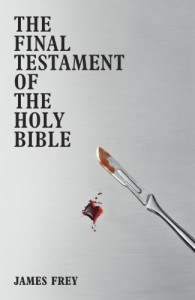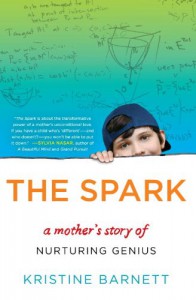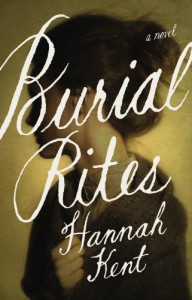 This is one of those great books that's set in history but doesn't come across as old. You get all the necessary descriptions to know what time period it's part of, but none of the tired and boring writing that I associate with older books.
This is one of those great books that's set in history but doesn't come across as old. You get all the necessary descriptions to know what time period it's part of, but none of the tired and boring writing that I associate with older books. The story's pace was perfect and there was plenty to keep my attention throughout.
I was expecting a little more at the end though as I felt like the rest of the book hinted at more than was eventually revealed. But even as-is, the ending was nice and understated.
Great book and great writing.
 For me, this book was much better than The Journal of Best Practices: A Memoir of Marriage, Asperger Syndrome, and One Man's Quest to Be a Better Husband. Where I found Best Practices to be whiny collection of get-out-of-jail-free ramblings, this book gave me a better idea of what Asperger's is like. Where Best Practice's author David Finch talks about how he ignores his family's laundry and only cares about his own, Robinson talks about the Aspergian quirk of renaming people and objects (I laughed out loud at what he called his parents).
For me, this book was much better than The Journal of Best Practices: A Memoir of Marriage, Asperger Syndrome, and One Man's Quest to Be a Better Husband. Where I found Best Practices to be whiny collection of get-out-of-jail-free ramblings, this book gave me a better idea of what Asperger's is like. Where Best Practice's author David Finch talks about how he ignores his family's laundry and only cares about his own, Robinson talks about the Aspergian quirk of renaming people and objects (I laughed out loud at what he called his parents). This book rambled a bit in some areas and I wondered whether it was due to his self-described Aspergian trait of sharp and intense focus, so it got a little slow for me near the middle and end. The final chapter in the book, "My Life as a Train," did nothing for me. I didn't get much from what I assume was supposed to be a sentimental and full-circle chapter; the epilogue did a good job of balancing it out a little.
Altogether, the book sort of starts out with a bit more promise and excitement than is eventually delivered, but it wasn't bad.
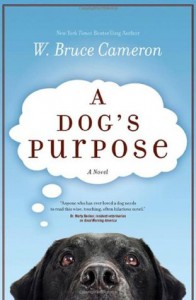 Even though I'm a huge dog lover, I wasn't prepared to like this book halfway through. It's charming enough, but for me, it would cross over from cute to corny quite often.
Even though I'm a huge dog lover, I wasn't prepared to like this book halfway through. It's charming enough, but for me, it would cross over from cute to corny quite often. I'm not about the author's intent, but a lot of the events were bittersweet for me, leaning more towards bitter, as I found myself feeling more sad than happy. More often than not, the scenarios reminded me of how many dogs are treated more like possessions than companions or living creatures with (as recent studies have shown) feelings much like children. The descriptions of the life of a working dog following descriptions of carefree puppies were difficult to feel okay about, but captured the loyalty of dogs very well. That, amongst other attempts at capturing what we have grown to assume of dogs' characters and thought processes, was probably the books greatest strength.
In some ways, it's a feel-good book, but I probably wouldn't read another book in this series. I can definitely see how people would really like these books, but this just wasn't for me.
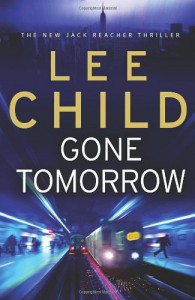 This was my first Lee Child book and was pretty disappointed. I don't know if I'd pick up another one of his books without a specific recommendation.
This was my first Lee Child book and was pretty disappointed. I don't know if I'd pick up another one of his books without a specific recommendation.I found 4/5ths of this book to be quite boring. The last fifth was interesting because it made some sense of the earlier portions of the book. However, it just wasn't amazing enough to justify a rather slower start.
In general, the book just wasn't interesting enough. Maybe I just don't have enough background on Jack Reacher as a character, but I didn't really understand his involvement in this case. Other than a coincidence that ties him to an event at the beginning of the book, his involvement seemed so unnecessary. Furthermore, in a book set in modern day (published in 2009), the whole "I don't know how to use a phone or a computer" schtick is not cute.
Jack Reacher was a really smart character but I just didn't care enough for why he was doing what he was doing and the story in general to care.
 Definitely the funniest book I've ever read as I don't know if I've laughed out loud reading a book before.
Definitely the funniest book I've ever read as I don't know if I've laughed out loud reading a book before. The first half of the book was far better than the second half in my opinion. "SantaLand Diaries," about being an elf for those mall family portraits, was the longest story but absolutely worth reading. "Season's Greetings to Our Friends and Family!!!" and "Christmas Means Giving" were hilariously exaggerated caricatures of certain types of people.
The shorter stories were a lot weaker than the longer ones. They came across as unrealized, like passing half-thoughts more than snapshots of complete stories. However, even in the short, less gratifying stories, there were funny parts, like in "He Shaves":
The teacher sadly shook her head, as if this explained everything that was wrong with my country. "No, no," she said. "Here in France the chocolate is brought by the big bell that flies in from Rome."
I called for a time-out. "But how do the bell know where you live?"
"Well," she said, "how does a rabbit?"
It was a decent point, but at least a rabbit has eyes. That's a start. Rabbits move from place to place, while most bells can only go back and forth--and they can't even do that on their own power. On top of that, the Easter Bunny has character; he's someone you'd like to meet and shake hands with. A bell has all the personality of a cast-iron skillet. It's like saying that come Christmas, a magic dustpan flies in from the North Pole, led by eight flying cinder blocks.
For me, the weakest stories were "Dinah, the Christmas Whore" because it wasn't very funny and you don't really know why anything happens the way it does, and "Let It Snow" because it was too short to really offer anything.
While I wish they would have removed some stories, it was a very entertaining book.
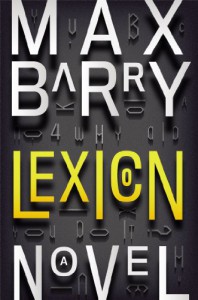 While I found the premise very interesting, the telling of the story didn't really work for me. I didn't fully understand why characters acted the way they did, particularly at the beginning, when the protagonist blindly obeys orders and years pass by in a matter of sentences, and at the end.
While I found the premise very interesting, the telling of the story didn't really work for me. I didn't fully understand why characters acted the way they did, particularly at the beginning, when the protagonist blindly obeys orders and years pass by in a matter of sentences, and at the end. The book relies heavily on your interest in the synopsis of the story because at the beginning, you aren't given much of a groundwork to understand what's happening, and there is a fair amount of action at the beginning. The middle of the book was very interesting to me. I wish they had elaborated more on the type of schooling, but I imagine that would be difficult creatively.
The book was interesting, but I walked away thinking it was just okay.
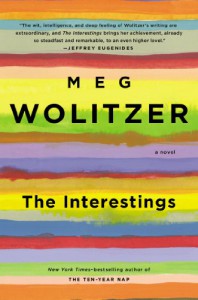 Took me so long to get into, roughly 250 pages into a 460-page book, but as soon as I was in tune with the characters, there was so much to take from the book. It's difficult to get into because there isn't an obvious plot line, so much of the book comes across as inconsequential and I think I kept looking for the turning point, which, over 250 pages, was a tiring mission. There were moments, paragraphs, and sentences here and there that were succinctly profound and self-aware, but buried amongst what seemed like an ocean of unnecessary information, they were barely enough to keep my interested; I almost put the book down several times.
Took me so long to get into, roughly 250 pages into a 460-page book, but as soon as I was in tune with the characters, there was so much to take from the book. It's difficult to get into because there isn't an obvious plot line, so much of the book comes across as inconsequential and I think I kept looking for the turning point, which, over 250 pages, was a tiring mission. There were moments, paragraphs, and sentences here and there that were succinctly profound and self-aware, but buried amongst what seemed like an ocean of unnecessary information, they were barely enough to keep my interested; I almost put the book down several times.I'm glad I stuck it through because the many characters you're introduced to at the beginning and struggle to keep track of (or at least for me, it's always a challenge with many characters and names) become very real people living very real lives, and it's this tone of realness that is, to me, most compelling about the book.
Following a group of teenagers that meet at an arts camp into their adult lives documents so many real thoughts and feelings that I could relate to despite not living their specific lives (like becoming a millionaire and producing TV shows and movies). We see the characters' experiences with aspiration, ambition, envy, friendship, and so many more things as stages of growing up, and at times, it was like reading about myself.
 The concept was cool - the character known as A wakes up in a different body every single morning - but the execution was very corny. The casual air of acceptance and diversity is commendable. People of all sizes, ethnicities, orientations, and genders are described as normal here. But other than that, there wasn't much else within the 300 pages to redeem the lacklustre story. Furthermore, the story ends conveniently before any answers to all the tough questions are explored. In that, I found this book lazy; an interesting concept not fully realized or thought about. Because of this, the rest of the book is filled with things that don't really matter as much.
The concept was cool - the character known as A wakes up in a different body every single morning - but the execution was very corny. The casual air of acceptance and diversity is commendable. People of all sizes, ethnicities, orientations, and genders are described as normal here. But other than that, there wasn't much else within the 300 pages to redeem the lacklustre story. Furthermore, the story ends conveniently before any answers to all the tough questions are explored. In that, I found this book lazy; an interesting concept not fully realized or thought about. Because of this, the rest of the book is filled with things that don't really matter as much.
 2.5 Stars. Pass.
2.5 Stars. Pass.Pretty good ending and I was satisfied with the way Hoag built the suspense. However, it didn't really pick up until at least halfway into the book, which was too slow for my tastes.
I was a bit bored by the first half. The concept wasn't interesting enough for me. The victim, who was murdered in a way that made her resemble a "zombie", is pretty much what the first half of the book rides on. While it certainly wasn't a cut-and-dry murder, it didn't offer anything else that drew me into the story. It was like I was supposed to be intrigued based solely on zombies being mentioned in the book, riding the coattails of recent movies and TV series based on them.
The murder and murderer don't really get much more interesting throughout. The intrigue halfway through and onward comes from the placement of characters, where everyone stands in relation to the victim.
All in all, it wasn't my favourite Tami Hoag novel as it didn't excite or interest me from the beginning unlike her previous books, but the story's conclusion sort of makes up for it. Sort of.
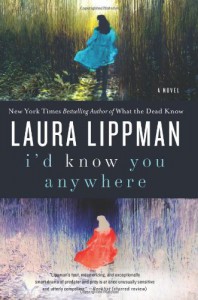 Enough mystery to keep you reading but not enough substance to leave you satisfied. The suspense doesn't really pick up until the last quarter of the book and the "twist" or reveal at the end was nothing at all, the story unchanged whether I had read it or not.
Enough mystery to keep you reading but not enough substance to leave you satisfied. The suspense doesn't really pick up until the last quarter of the book and the "twist" or reveal at the end was nothing at all, the story unchanged whether I had read it or not.
 As much about the daily struggles with self-worth as it is about an overweight sibling. Revealing and honest.
As much about the daily struggles with self-worth as it is about an overweight sibling. Revealing and honest.
 There were so many good moments in this book that made me want to like the book as a whole more than I eventually did. My enjoyment was definitely affected by the way I read it - whenever I had time, on the train, commuting, right before bed. This disjointed way of reading often cut into the flow of the book as the content was sometimes pages upon pages of connected thoughts, a visible stream of thoughts uninterrupted by punctuation or line breaks. I found that whenever I read these portions completely in one sitting, I took so much more from it and was able to be completely enraptured by the moment.
There were so many good moments in this book that made me want to like the book as a whole more than I eventually did. My enjoyment was definitely affected by the way I read it - whenever I had time, on the train, commuting, right before bed. This disjointed way of reading often cut into the flow of the book as the content was sometimes pages upon pages of connected thoughts, a visible stream of thoughts uninterrupted by punctuation or line breaks. I found that whenever I read these portions completely in one sitting, I took so much more from it and was able to be completely enraptured by the moment. So many poignant moments. Google "Extremely Loud and Incredibly Close quotes" and you'll likely see what I mean. The book was written in different viewpoints and I could have done without some chunks of the book. That and the disconnected way I read the book contributed to an overall average experience with the less enjoyable portions neutralizing the great portions of the book.
Don't know if I would recommend this book, but I can definitely understand that for some or many, there is something great to be taken from it.
 Flew through this book because I wanted to see how it ended, so it did a great job of getting me hooked. The explanation for it all was not as satisfying a twist as I would have liked but I like the way Harlan Coben reveals the twist near the end, and then fifty more twists in the last few chapters.
Flew through this book because I wanted to see how it ended, so it did a great job of getting me hooked. The explanation for it all was not as satisfying a twist as I would have liked but I like the way Harlan Coben reveals the twist near the end, and then fifty more twists in the last few chapters. My only complaint would be that I found some of the writing to be very corny, particularly near the beginning. I guess Coben was trying to write more conversationally as the lead character is just a regular guy, but it was almost painful to read because there were so many commas and dashes that broke up the sentences unnecessarily. For example:
In the beginning and, well, throughout the book, Harlan Coben's writing was - to say the least - chunky and interrupted by - and I'm not joking - commas, interjections, and dashes that were, at least in my opinion, not, as some would consider, necessary, which made it cumbersome to read - not that I didn't enjoy the book.
Other than that, this is a pretty typical Harlan Coben book. Nothing too special, but if you're a fan of the genre, it would be an enjoyable story.
 Really appreciated the narrative voice of this book. It was so simple and accessible. And this book is set in the past - "back in the day" - which is something I usually avoid because I feel like the language used to describe these times sounds equally as dated. That wasn't the case with this book for me. If anything, only the subdued simplicity of the times was conveyed through the text and it complemented the story well.
Really appreciated the narrative voice of this book. It was so simple and accessible. And this book is set in the past - "back in the day" - which is something I usually avoid because I feel like the language used to describe these times sounds equally as dated. That wasn't the case with this book for me. If anything, only the subdued simplicity of the times was conveyed through the text and it complemented the story well.I enjoyed the first third, but found the middle third too slow and somewhat boring. I had contemplated putting the book down and starting something else a couple times. I'm glad I didn't though; the ending was satisfying and wrapped everything up nicely.
This was an enjoyable book with a soothing subdued voice.



